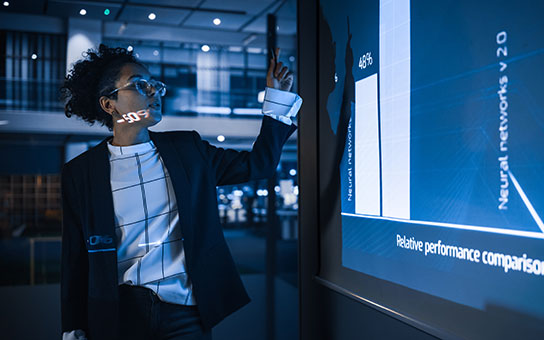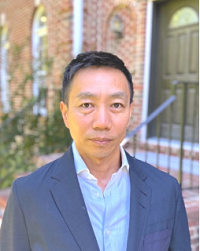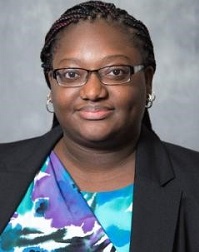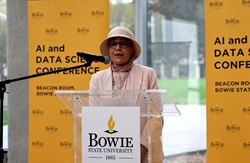
Why You Should Attend What You'll Learn View the Speakers View the Program (pdf)
AI and Data Science Conference
Artificial Intelligence, Data Science and Cybersecurity
- April 11, 2025
- 8 a.m. – 5 p.m.
- Bowie State University - 14000 Jericho Park Rd., Bowie, MD 20715
- Beacon Room/Science Building (#18 on the Campus Map - free parking except for reserved or disabled spots)
- Contact: Dr. Md Kamruzzaman Sarker - msarker@bowiestate.edu | 301-860-4501
Bowie State University, Maryland’s first historically Black college and university, is proud to host this inaugural event. With a strong emphasis on academic excellence, innovation and community impact, Bowie State is a leader in preparing students for careers in technology, science and beyond. The university’s Department of Computer Science continues to advance research and education in artificial intelligence, data science and cybersecurity, making it an ideal venue for fostering dialogue on these critical topics. Conveniently located in Bowie, Maryland, the university is situated between Washington, D.C. (17 miles) and Baltimore (25 miles), providing easy access to both metropolitan areas.
Why You Should Attend
The inaugural Bowie State University AI and Data Science Conference will take place on April 11, 2025, from 8 a.m. to 5 p.m. with the theme Artificial Intelligence, Data Science and Cybersecurity. This event will bring together experts, faculty members, and students to discuss and explore the latest advancements and challenges in AI and data science, with a focus on their applications in cybersecurity.
The conference will feature invited talks, panel discussions, and a workshop led by distinguished experts from academia, industry, and government. These sessions will delve into cutting-edge research, practical applications, and ethical considerations at the intersection of AI and cybersecurity, providing a platform for knowledge exchange and fostering collaboration among attendees.
The program will begin with an opening keynote speech, followed by three invited talks addressing key topics in AI and cybersecurity infrastructure. Two panel discussions will follow: the first will focus on identifying essential hands-on skills in AI and data science, and the second will address cybersecurity challenges and AI-guided solution strategies. In the afternoon, the conference will feature two additional invited talks and conclude with a workshop designed to equip participants with practical skills in AI and data science.

Conference Highlights
Keynote Speeches
Hear from industry experts and academic pioneers who are shaping the future of AI and data science.
Panel Discussions
Engage in in-depth discussions on topics like machine learning, data analytics, natural language processing, computer vision, and generative AI.
Workshops
Hands-on sessions to help attendees gain practical skills in AI model development, data engineering, and ethical AI practices.
Poster Session
Explore innovative ideas and research in our poster session, where students and early-career researchers showcase their latest projects and receive feedback from conference attendees and experts. This session offers a dynamic opportunity to engage with emerging research and exchange ideas in an interactive setting.

An Engaging Roster of Presenters
Keynote Speakers
- Tina Williams-Koroma, Founder & CEO, TCecure
- Dr. Tian Lan, Professor, Department of ECE, George Washington University
- Dr. Kun Sun, Professor, Department of Information Sciences and Technology, George Mason University
- Dr. Sean Guillory, Booz Allen Hamilton
- Bahirah Adewunmi, Booz Allen Hamilton
Panelists
- Dr. Martial Michel, Vice President, AI & Data Science & Chief Technologist, CTO, Infotrend Inc.
- Dr. Abu Zaher Md Faridee, Applied Scientist, Amazon
- Dr. Malarvizhi Arulraj, Assistant Research Scientist, University of Maryland College Park
- Dr. Ida Ngambeki, Assistant Professor, Information Systems, University of Maryland Baltimore County
Speaker Abstracts and Biographies
 Multi-Agent Decision-Making in the Open World
Multi-Agent Decision-Making in the Open WorldAbstract: AI/ML has demonstrated tremendous success in many challenging tasks with superhuman performance. Many decision-making problems in the open world are too complex to be modeled as a monolithic single-agent problem and thus require the formulation of multi-agent decision making. In this talk, we present some recent research progress on multi-agent decision-making in the open world. We will discuss some key challenges in this space, such as the collaborative decision making, game-theoretical formulations, multi-agent skill discovery, partial observability, and the need for explainability, scalability, and human oversight/feedback. We will also demonstrate several applications of the results to real-world network infrastructures, such as datacenter resource reservation and 5G network management.
Biosketch: Tian Lan is a professor at the Department of ECE, George Washington University in DC. He received PhD in Electrical Engineering from the Princeton University. His research interests include machine learning, optimization, and relevant applications to networking and cyber security. The research is currently being supported by NSF, DARPA, ONR, ARO, USMA, Meta, and CISCO. He has received 6 best paper awards (e.g., IEEE Signal Processing Society, INFOCOM, Globecom, and Mobihoc), 6 industry research awards (from AT&T, CISCO, and META), as well as several faculty recognition and innovation awards. He is currently serving as a member of FCC Technological Advisory Council (TAC), INFOCOM 2026 TPC Chair, Fellow of National Quantum Lab at UMD (NQL), Distinguished Fellow at Center for Cyber Diplomacy and Leadership (CCDL), and Associate Editor for IEEE/ACM Transactions on Networking.
The AI Paradox: Weaponizing and Undermining Intelligent Systems
Abstract: In the age of AI, the lines between offense and defense blur. We'll dissect the paradoxical nature of AI, showcasing how it can be weaponized for sophisticated cyberattacks, while simultaneously being vulnerable to adversarial techniques that erode its core intelligence. Gain insights into both sides of this critical cybersecurity challenge.
Biosketch: Bahirah is a cyber and analytics thought leader and Founder of Booz Allen Hamilton’s Black Analytics Group (BAG). BAG develops research and engagement projects devoted to the advancement of equity and inclusion in and via STEM. Bahirah designed and led the execution of Booz Allen’s Historically Black Colleges and Universities (HBCU) Capstone Initiatives to establish mutually beneficial partnerships with HBCU STEM departments and dynamically engage underserved STEM talent. Bahirah is a Certified Ethical Hacker and works as Advanced Data Scientist and Researcher within Booz Allen’s National Cyber Platform. She is a multi-coastal transplant by way of Oakland, California; Atlanta Georgia; and Bronx, New York and holds degrees from Cornell University and Carnegie Mellon University. She's currently studying as a PhD student in the topics of cyber security and artificial intelligence at the Information Systems department of the University of Maryland, Baltimore County. She’s an avid wiener dog mom, outdoor gardener, Pittsburgh Steelers fanatic, and collector of orchids and Lego sets.
Data Provenance, Privacy, and Security in AI
Abstract: TBA
Biosketch: Dr. Kun Sun is a Professor in the Department of Information Sciences and Technology at George Mason University. He is also the Associate Director of Center for Secure Information Systems (CSIS) and the Director of Sun Security Laboratory. He received his Ph.D. in Computer Science from North Carolina State University. His research focuses on systems and network security. Dr. Sun has more than 20 years working experience in both industry and academia, publishing over 150 conference and journal papers, and four papers won the Best Paper Award. His current research focuses on software security, network security, trustworthy computing, moving target defense, AI security, and cloud security. He won the Presidential Award for Faculty Excellence in Research from George Mason University in 2022.
AI's Impact on Entry-Level Cybersecurity: What’s Disappearing & How to Prepare
Abstract: TBA
Biosketch: Tina C. Williams-Koroma, Esq., CISSP, PMP, is a serial entrepreneur – Founder/CEO of TCecure, and most recently, Founder of CyDeploy (https://www.cydeploy.com). She is a Maryland licensed attorney and possesses a BS in Computer Science from the University of Maryland Baltimore County (UMBC), a MS in Management from Rensselaer Polytechnic Institute, and a JD from the University of Maryland Francis King Carey School of Law. She is extremely community-minded, having partnered with local institutions and contributed to several boards.
Using Containers to Develop Machine Learning Applications.
Abstract: The workshop will be split into:
- Introduction to containers
- How to use CTPO (CUDA TensorFlow PyTorch OpenCV) and its setup
- Demonstration of a few applications
- CTPO: Cuda, TensorFlow, PyTorch, OpenCV
CTPO is a container solution that provides the building blocks for research, development, and deployment of Machine Learning, Computer Vision, Natural Language Processing, and Data Science solutions. Being a container, CTPO also supports idempotent deployments: what works on one install is transferable to another system.
CTPO is free and open-source. End users can tweak it to develop, test, and prototype on local GPUs, in the cloud, and even using Jupyter Notebooks. It supports developing, prototyping, and idempotent deployment of Data Science, Natural Language Processing, Computer Vision, and Machine Learning applications.
Biosketch: Dr. Martial Michel is the Chief Technologist for Infotrend Inc., a Full-Stack Solutions Architect with over 25 years of experience in the fields of Cloud Computing, High-Performance Computing, Computer Vision, Machine Learning, and Natural Language Processing. Dr. Michel is the recipient of a Bronze Medal for Superior Federal Service after developing novel evaluation frameworks supporting foundational research and advancements in media analytics. Dr. Michel is the co-chair of the OpenStack Scientific Special Interest Group, served as co-chair of the IEEE 2302-2021, and was a contributor to the NIST SP 500-332.
Biosketch: Dr. Sean Guillory attained his Ph.D. in Cognitive Neuroscience from Dartmouth College. He primarily worked with neurosurgery patients to help improve the mapping for brain functions that were personally important to their lives. After taking that experience to help build up a start-up business incubator aimed at helping humanity (Fruition Tech Labs) and working on data science efforts to help catch online scammers (ConsumerAffairs), he now focuses on ways of utilizing his background in automation, biometrics, and social science methodology to help with issues within Defense and National Security. He is also a proud member of the Information Professionals Association, the Mind Science Foundation’s Science Committee, and a Thematic Task Force lead for the National Science Foundation’s Engineering Research Visioning Alliance (ERVA).
 Biosketch: Dr. Ida Ngambeki is an Assistant Professor of Information Systems at the University of Maryland Baltimore County. Previously she was an Assistant Professor of Computer and Information Technology at Purdue University. Dr. Ngambeki graduated from Smith College with a B.S. in Engineering and from Purdue University with a PhD in Engineering Education. Dr. Ngambeki’s key areas of research interest include: Cybersecure behavior, social engineering, cybersecurity Education, cybersecurity Policy, and cybersecurity workforce development. Dr. Ngambeki’s research investigates human factors in cybersecurity, how the affordances of information technologies affect individuals’ learning and decision-making and the wider policy implications of those choices, how social and personality factors can be manipulated to compromise cybersecurity, the social and psychological factors influencing individuals’ cybersecurity choices, how students learn secure programming, how individuals develop an interest in and make-decisions about their careers in computing and how individuals use information technology to engage in political participation.
Biosketch: Dr. Ida Ngambeki is an Assistant Professor of Information Systems at the University of Maryland Baltimore County. Previously she was an Assistant Professor of Computer and Information Technology at Purdue University. Dr. Ngambeki graduated from Smith College with a B.S. in Engineering and from Purdue University with a PhD in Engineering Education. Dr. Ngambeki’s key areas of research interest include: Cybersecure behavior, social engineering, cybersecurity Education, cybersecurity Policy, and cybersecurity workforce development. Dr. Ngambeki’s research investigates human factors in cybersecurity, how the affordances of information technologies affect individuals’ learning and decision-making and the wider policy implications of those choices, how social and personality factors can be manipulated to compromise cybersecurity, the social and psychological factors influencing individuals’ cybersecurity choices, how students learn secure programming, how individuals develop an interest in and make-decisions about their careers in computing and how individuals use information technology to engage in political participation.

